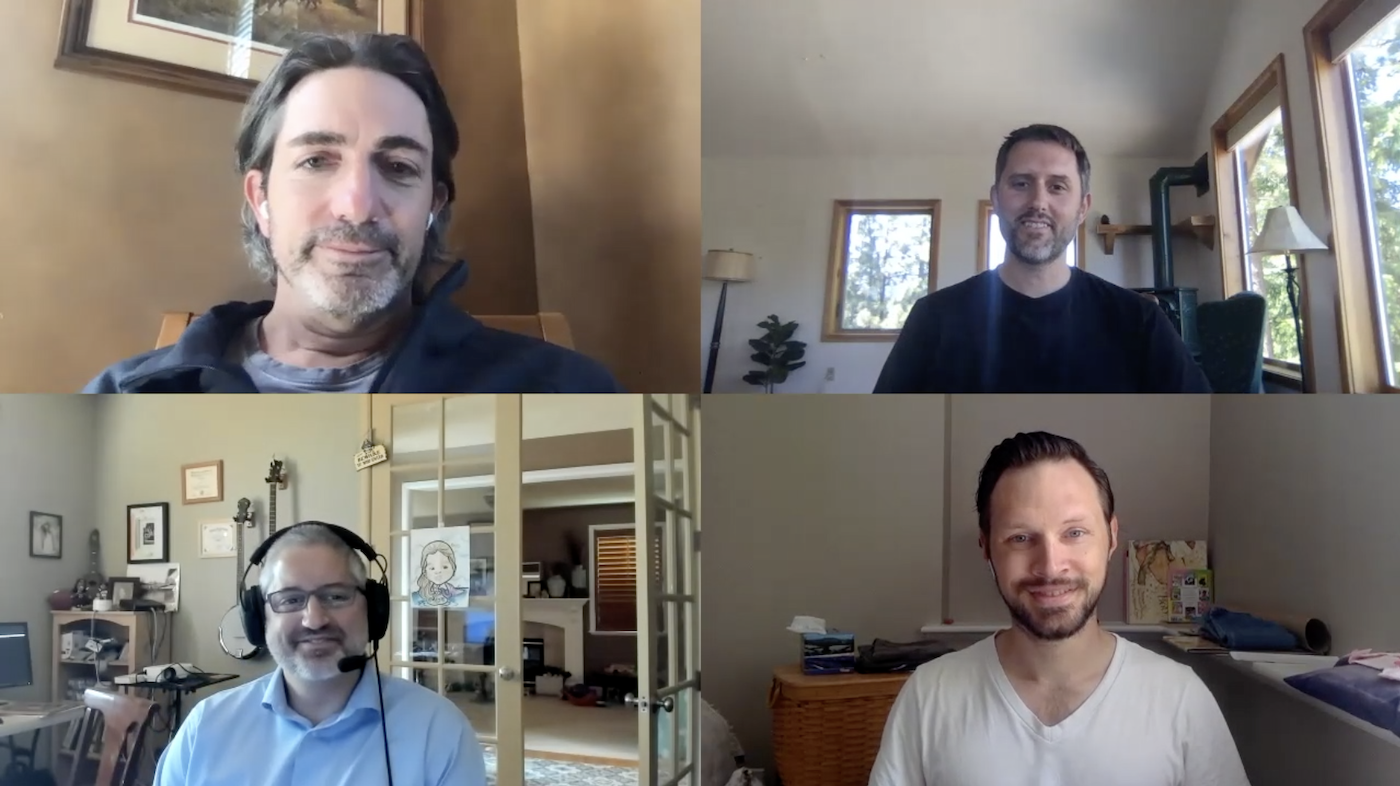Blockchains, the State of the Crypto Ecosystem, Proof-of-Stake, and Figment Networks :: with Lorien Gabel, Andrew Cronk, and Tony Little

In this episode of Ventures we dive into all-things blockchains, the state of the ecosystem, the evolution of the industry (especially since 2017), the nuances between Proof-of-Work and Proof-of-State, and the suite of services that Figment Networks provides.
This episode is both an introduction to the blockchain space (for those new), and a deep-dive into nuanced blockchain topics if you are an industry expert.
Guests: Lorien Gabel, Andrew Cronk, and Tony Little.
You can watch this episode below or listen on Apple Podcasts, Spotify, Google Podcasts, or wherever you get your podcasts.
2:10 - Lorien initial intro and how he got connected to Andy
4:04 - Andy initial intro and how he got connected to Will
5:50 - Side question/topic/thought - How can people meet like Andy/Will did (same office building, through the office manager) in the future when most people may not be heading into an office anymore?
6:16 - Tony intro, how he got into the blockchain space, and how he’s been involved with exploring / working with blockchains at the enterprise level, including how those can intersect with public blockchains.
8:47 - Question: Tell us more about Figment Networks. What is the story and what is the company up to?
11:20 - Backing up and getting more high-level, what is a blockchain?
13:08 - Tony’s bar fight analogy regarding blockchains keeping a record of the bets.
16:20 - Lorien’s comment regarding blockchains as creating digital scarcity, and Tony’s followup comment regarding blockchains providing a source of truth, and who to “reward”.
17:06 - Will’s recollection of Tony’s Harry-Potter-esque description of blockchains replicating information across nodes.
18:14 - What is Proof-of-Work? Proof-of-Stake? Why do these matter in the blockchain ecosystem?
22:02 - The three layers of blockchains: networking, consensus, and changing application state.
22:49 - Blockchains can track other state changes besides payment transactions
21:20 - Tony’s comment regarding Proof-of-Work really being Proof-of-Stake indirectly within Proof-of-Work
25:40 - Is “decentralization” destined to simply recreate a different form of centralization again? How important is decentralization?
26:50 - Tony’s comment regarding how enterprises think about the process of decentralization over time.
28:01 - What are the different components/players within the blockchain ecosystem today?
31:03 - Analogy of a real estate developer handing off a group of homes to a homeowners association.
31:50 - How original network founders continue to help grow the network over time.
32:48 - Where does Figment Networks specifically contribute within the overall blockchain ecosystem?
36:19 - When starting up a new blockchain network, at what point should founders talk to Figment about helping out? How should founders think about the steps of building their networks?
37:40 - Staking Hub, a group for the validator community, and a place for network founders to recruit validators
38:22 - Figment has been up close and personal with 15+ network launches, what are best practices for launching a network?
40:35 - Problems with so many new networks coming out of academia and theory/research backgrounds. “Productionizing theory is….challenging”
41:18 - What has Tony seen on this topic with regard to enterprises bringing blockchains to market (built on technology like Hyperledger)?
45:05 - Enterprise consortiums vs. projects like Libra. How do they compare? How do token economics come into play, if at all?
46:59 - What are the big problems in the blockchain space? (Governance and ease of building, starting here with Governance)
49:59 - Why is governance participation so hard to encourage? Is there maybe not enough economic or social incentive at play in most networks?
51:30 - Are any networks modeling their governance similar to country governments? (e.g. legislative, judicial, and executive branches?)
52:50 - People are trying all kinds of interesting approaches to governance. We’re in the middle of one giant experiment to see what works. Both “control” and “iteration speed” are important to consider when architecting governance.
54:38 - What problems exist currently in the blockchain ecosystem for decentralized application (dApp) developers?
56:43 - For developers, the current perspective is Ethereum vs. everything else.
58:04 - What is the Ethereum 1 to Ethereum 2 transition, and why is that important for the blockchain community?
59:06 - What prompted the Ethereum change? What is it needed?
1:01:17 - What will be the difference between Ethereum 2 and interoperability chains like Cosmos or Polkadot? (sharding vs. separate/dedicated infrastructure, analogy to shared hosting vs. dedicated servers)
1:05:22 - What is Figment’s Data Hub all about? How will it help networks and dApp developers?
1:07:50 - Could Data Hub be analogous to the smartphone in terms of opening up new possibilities for future innovation in the blockchain space?
1:10:50 - Vision for dApp developers to make applications to exploit the features of a particular chain, vs. trying to make applications more generic across chains.
1:11:20 - Where do you see the blockchain ecosystem heading? What sorts of things should we be looking out for in the future? How do you see Figment Networks playing a role? (DeFi is all the rage these days, but Figment is not planning to play a major role in DeFi. Figment is more interested in exploring and enabling many other use cases for blockchains beyond DeFi that weren’t able to be done before)
1:14:10 - Oasis project - computation on encrypted data
1:16:01 - Why Jeff Bezos started Amazon… because there was no other way to get all the SKU for books in a store. What analogous solutions can blockchain enable? This is a more interesting question, and Figment is helping the community think about and build answers.
1:17:40 - Livepeer as an example of how to create a utility at a lower cost using blockchains